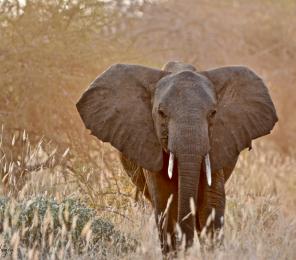
Bruce A. Schulte, Ph.D.
University Distinguished Professor and past Department Head of Biology
Western Kentucky University
Dr. Bruce A. Schulte (He, His, Him) is the Associate Vice-President for Strategy, Performance and Accountability at Western Kentucky University. He also is a University Distinguished Professor and he was the Department Head of Biology from 2009-2019. Bruce is studying human livelihoods, biodiversity, elephant behavior, and ecosystem functions in the Tsavo ecosystem in Kenya, in partnership with Wildlife Works. His efforts are helping to conserve the region and ensure that humans and wildlife maintain a mutually beneficial, sustainable relationship.
What inspired you to pursue this research study?
The juncture of human livelihoods, ecosystem function, and the maintenance of biodiversity requires a holistic approach in which humans and wildlife are both a part of the solution. The collaboration between Wildlife Works and Western Kentucky University provides an opportunity to look at a combination of approaches to establish a sustainable, mutually beneficial relationship between humans and wildlife in the greater Tsavo National Park ecosystem of southern Kenya.
What is the most interesting aspect of studying wildlife such as elephants?
The life history of African savannah elephants parallels that of humans in terms of age of maturation, years of reproductive activity, and longevity. Their complex social structure and intelligence create a strong connection to the human condition. Elephants never cease to amaze us, and our appreciation of elephants can lead to a better understanding and empathy for our own species.
How does citizen science support your research?
At all levels of our education system, teachers realize that hands-on, experiential learning changes thinking and remains a part of the individual’s psyche more permanently than traditional classroom instruction. To change human behavior so that humans can adopt a more sustainable lifestyle and slow or stop the sixth great extinction, people of all ages and walks-of-life need to be involved. In colleges and universities, we stress the idea of lifelong learning, and working with volunteers in field research provides a mechanism for such experiential learning to occur.
Furthermore, the mixing of cultures and backgrounds that occurs in volunteer research opens a window of opportunity to dislodge cultural barriers and facilitate a global society. Working with volunteers is fun, rewarding, and life changing. On a practical basis, our project involves many components that need to occur simultaneously. A number of the day-to-day responsibilities do not require a great deal of training or a specific scientific skill set, so the project is well suited for volunteers.
Education
- Ph.D. in Biology, State University of New York, College of Environmental Science and Forestry
- MS in Biology, University of Southern California
- BS in Biology, College of William and Mary
